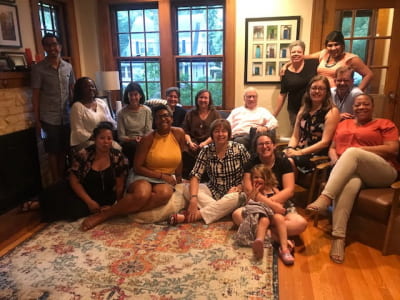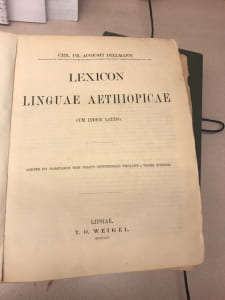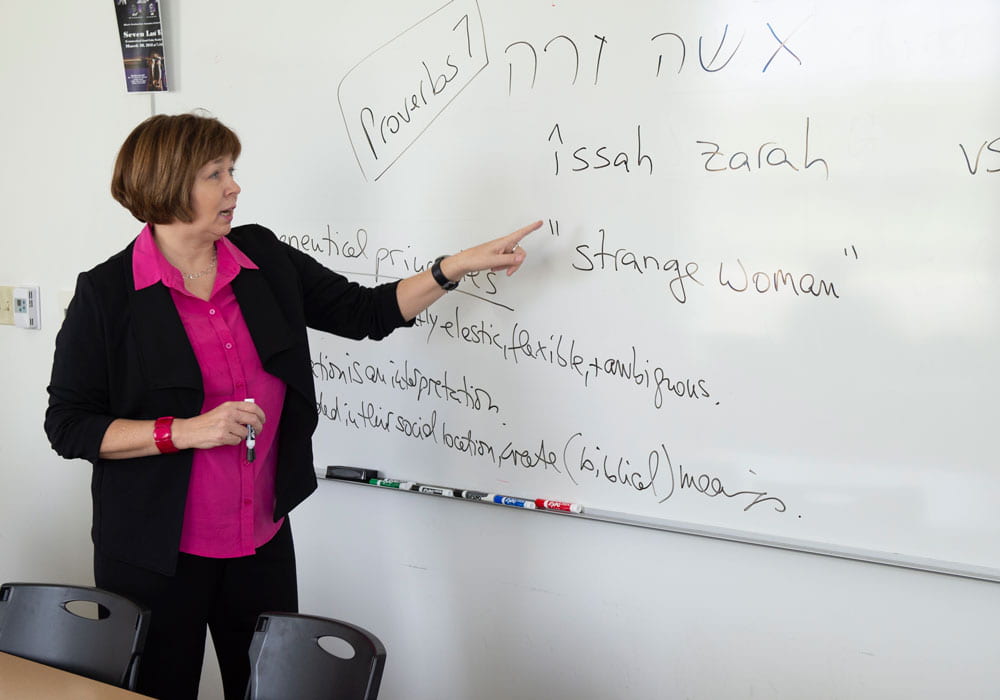As a Professor of Old Testament, Susanne Scholz has devoted her professional life to the study of texts that are ancient — but far from irrelevant. Many Christians look to them for insights on contemporary issues like abortion and the Israel/Palestine conflict – and often, without a deep understanding of history, politics and social location, all profoundly shaping the interpretation of the Bible.
That’s the uphill battle that Scholz has accepted as her professional challenge, and she’s very passionate about it.
“I have an acronym for the way many Christians read the Bible today: PPS — privatized, personalized and sentimentalized,” she said. “It drives me nuts. It’s dangerous. People get killed –intellectually and spiritually and politically killed. I feel driven to make a dent in all the ignorance.”

On that academic quest, Scholz traveled to New York and to Israel/Palestine this summer, in both cases on a search for the truth of Old Testament texts that might help shed clearer light on today’s debates.
Scholz spent July in New York, on a deep dive into Numbers 5:11-31, as part of the CrossCurrents Summer Research Colloquium. The fellowship gathered scholars working on projects related to reproductive justice, giving them access to libraries and research facilities at Columbia University, Union, Auburn, and Jewish Theological Seminaries. Fellows do independent research and then gather for discussion and meals each night. (Reproductive justice is another key focus for Scholz; last spring, she spearheaded an interdisciplinary symposium at SMU on reproductive justice, a conceptual framework based on three broad principles that 12 African American women activists developed in the 1990s: the right not to have a child, the right to have a child, and the right to raise children in safe and healthy communities.)
She chose to study Numbers 5:11-31 because some believe the text depicts an abortion; it’s cited in both pro-life and pro-choice arguments. The passage describes an “ordeal by bitter water,” a test designed by a priest to determine whether a woman suspected of adultery was guilty or innocent.
The question that gripped Scholz: Was the woman in the story an adulteress or was she not rather “seduced” and thus possibly a rape victim survivor? To find an answer, she tracked down the definition of a single word, found only in an 1865 Ethiopic Latin dictionary that she unearthed in Columbia University’s library. Her conclusion: the translation possibilities are ambiguous, as is typical of sacred texts like the Bible. It’s possible that “seduced” was used as a euphemistic expression for rape, which opens up a very different view about the woman and her entire ordeal depicted in Numbers 5, also called “The Sotah” in the Jewish tradition where this passage is famous.

Scholz also traveled to Israel/Palestine this summer and visited, among many other places, Tel Shiloh, an archaeological site identified as the location of the ancient city of Shiloh in Samaria. (Shiloh is mentioned in many places in the Bible, including in the story of Hannah and the Ark in 1 Samuel.)
Plans are to turn Tel Shiloh into a major tourist attraction site on the West Bank. Leaders of the Christian Right, including former Arkansas governor Mike Huckabee, visited Shiloh, and U.S. donors sympathetic to West Bank settlers support the development.
“Because the site is located on the land of the Palestinian village Qaryut, the project has broad political implications,” she said. “The Christian Right and Israeli settlers are saying that Shiloh was the first capital of Israel, which is a total invention, and they are in the process of making the site into an attraction like Disney World. I find that deeply upsetting.”
One of the Christian Right groups that currently supports the fourth archaeological season scheduled for the summer of 2020 at Tel Shiloh is the Associates for Biblical Research (ABR), which describes itself as a “Christian apologetics ministry dedicated to demonstrating the historical reliability of the Bible through archaeological and Biblical research.” Scholz says project leaders lack solid academic credentials and they conflate biblical history with the origins of modern Israel.
“It is a misleading but popular hermeneutical strategy among many Christians and Jews,” she said.
She fears the project will skew American tourists’ view of the Israeli-Palestinian conflict and unfairly buttress Israeli settlers’ claims to the West Bank. During her visit, a Palestinian guide showed her the area and described the difficult living conditions for Palestinians in the West Bank.
Scholz will present her research in September, in a talk titled “The Disney-fication of Shiloh,” at the European Society of Women in Theological Research (SWTR) International Meeting in Leuven, Belgium.
Teaching Specialties
Hebrew Bible/Old Testament; gender in biblical literature; Hebrew Bible in film; historiography; narrative literature; social location and biblical hermeneutics
Research Interests
Feminist hermeneutics; epistemologies and sociologies of interpretation; cultural and literary studies; violence against women in sacred texts
Favorite Bible Verses
Genesis 1:1-2, which she recites in Hebrew at the beginning of each class. The first verse begins with the consonant bet in the word bereshit; this consonant is the second letter of the Hebrew alphabet and is assigned the number 2. Jewish sages pondered: if the Torah is perfect, why does the Bible not begin with aleph, the first letter of the Hebrew alphabet, standing for 1 and unity and God? “It’s because the moment we are created, we are in duality,” Scholz explains. “The moment we read the Bible, we are in duality, in the world. We are not in God’s oneness anymore.”
Books on Her Nightstand
Scholz loves reading non-fiction; she discovers many of the books on her reading list through C-SPAN’s Book TV series. Two current books: The Age of Surveillance Capitalism: The Fight for a Human Future at the New Frontier of Power by Shoshana Zuboff, and The New Authoritarians: Convergence on the Right by David Renton.
Fantasy Dinner Party
Not surprisingly, Scholz would invite five prominent figures of the Bible: Jesus, Mary Magdalene, Moses, Hagar and Miriam. Questions she’d ask: “Did you really exist?” and “You gave us so much and yet we are so much in a fog. Tell us what you really think and what you really did.”

Pets
Wisky-Carlos, a 19-lb., well-traveled Himalayan cat born in Texas ten years ago.
Signature Dish
While on a study retreat in a cottage in Newfoundland this summer, she developed her own recipe; it’s a barbecued cod, baked in foil with onions, mustard seed, a little red pepper, and butter.
Something Most People Don’t Know About Her
“I can stand on my head for 10 minutes,” she said. “It’s a pose called sirsasana in yoga, which is my way of relaxing. However, I can’t do padmasana, the pretzel pose. Only God and my knees know why.”
